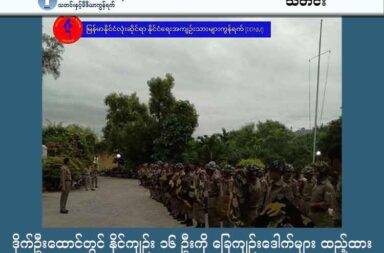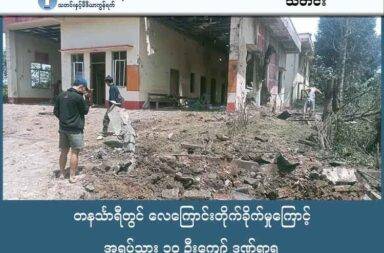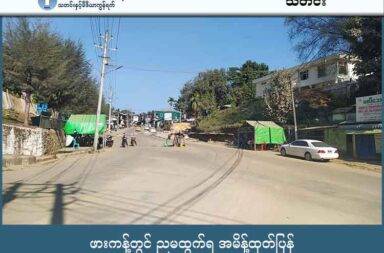Fighting Traps Hundreds of Truckers and Traders on Chinese Border
By NETWORK MEDIA GROUP (NMG)
Tuesday, August 27, 2019
More than 300 transport vehicles have been stranded in a special trading zone in northern Shan State’s Muse Township since intense clashes between government forces and ethnic armies began in the area earlier this month.
Truckers and traders who depend on access to the highway into Burma from China say they are struggling to survive as the conflict, which began when an alliance of three ethnic armed groups mounted a series of bold attacks on army targets on August 15, drags on.
“Some people have been stuck here for 10 days. We’re having a hard time just feeding ourselves. It costs at least 7,000 kyat (US$4.60) a day to stay here,” said Sai Lao Kham, one of hundreds of truck drivers who ply the highway that links China and northern Shan State.
The trucks, which include many 12-wheel rigs as well as smaller vehicles, carry everything from potatoes and fresh fruit to bicycles and electronics.
“There are many kinds of fruit now being sold in the trading zone, including grapes and apples. The traders can’t keep them in storage for long, so they have to sell them here,” said Sai Lao Kham.
Another driver, Htet Kyaw, told NMG that he and others have had to rely on handouts—mostly from companies based in the nearby town of Muse—as they remain stranded at the 105-Mile Trade Zone, the largest special trade zone of its kind in Burma.
“We’re running out of money, so we have to eat whatever people give us. The situation on the road is still bad, so we’re stuck here. A few vehicles left yesterday, but they got trapped on the road between Namphetka and the Nam Khai Bridge. Some came back yesterday,” he said.
“We want the road to open again as soon as possible,” he added. “I don’t understand politics, but we have to support our families.”
According to the drivers, many trucks have also been trapped in Muse and at big petrol stations near the trading zone. Hundreds more are said to be stranded along the national highway between Kutkai and Muse.
Truckers are not alone in suffering the economic costs of the conflict; traders say they are also bearing a heavy burden by not being able to get back to business as usual.
“Money is flowing from our hands. I left my children at home and I want to see them. I transport bicycles to Mandalay. I used to go four times a month on this road, but now I can’t go anywhere. All traders and drivers want the road to be opened again as soon as possible,” said Mi Mi Kyaing, a local trader who spoke to NMG.
Many roads in the area have been closed since three ethnic armed groups—the Arakan Army, the Ta’ang National Liberation Army, and the Myanmar National Democratic Alliance Army—carried out joint attacks on the Defense Services Technological Academy in Pyin Oo Lwin and police and army camps in northern Shan State on August 15.
Many of the clashes have taken place along the Mandalay-Muse highway, and on Monday, fierce fighting between Kutkai and Muse forced the complete closure of the section of the highway linking the two towns.
According to local civil society organizations, nearly 6,000 civilians in Shan State’s Lashio, Hsenwi, Kutkai and Namkham townships have been displaced by the fighting.


